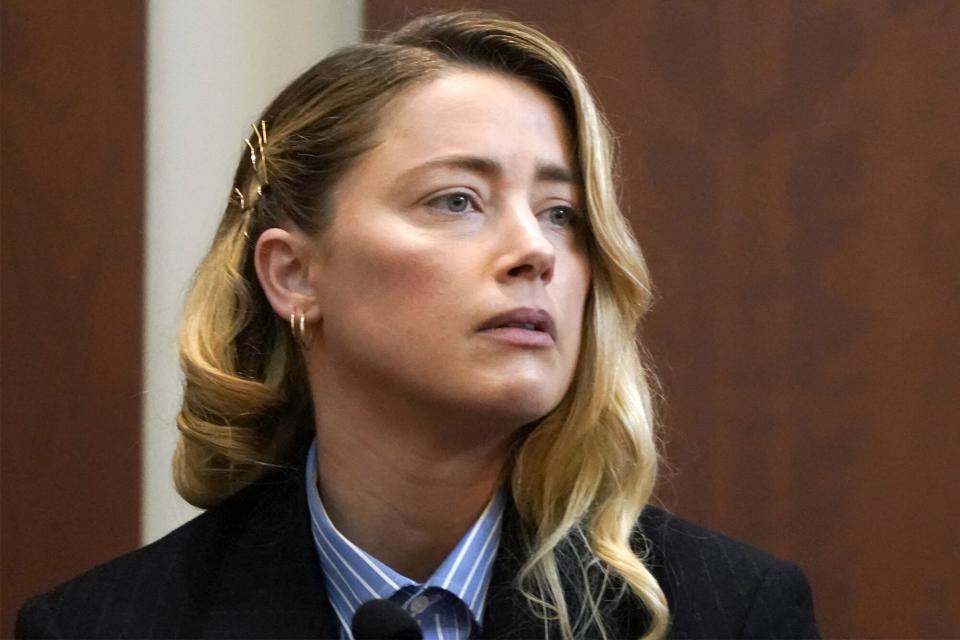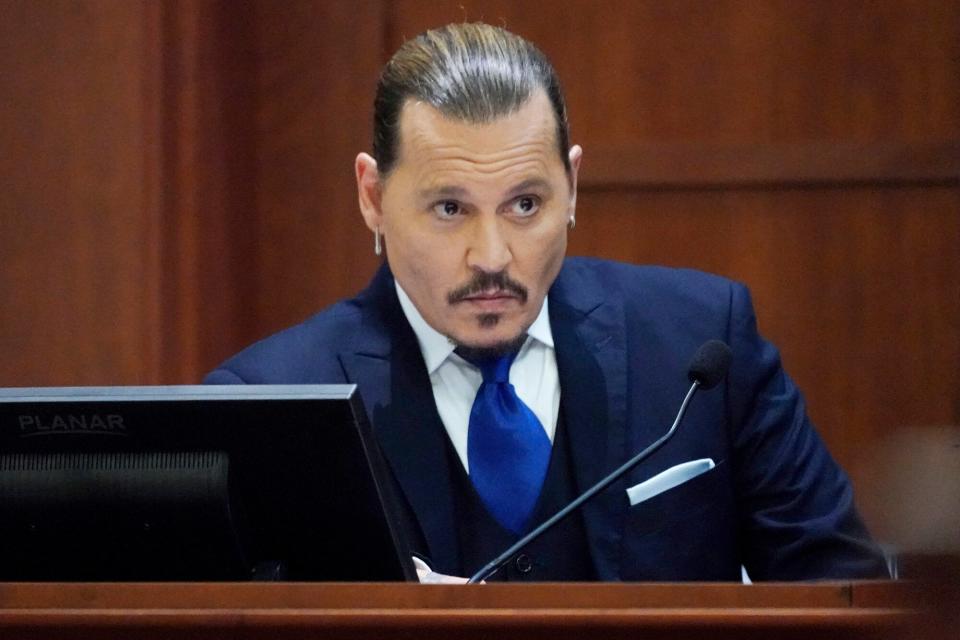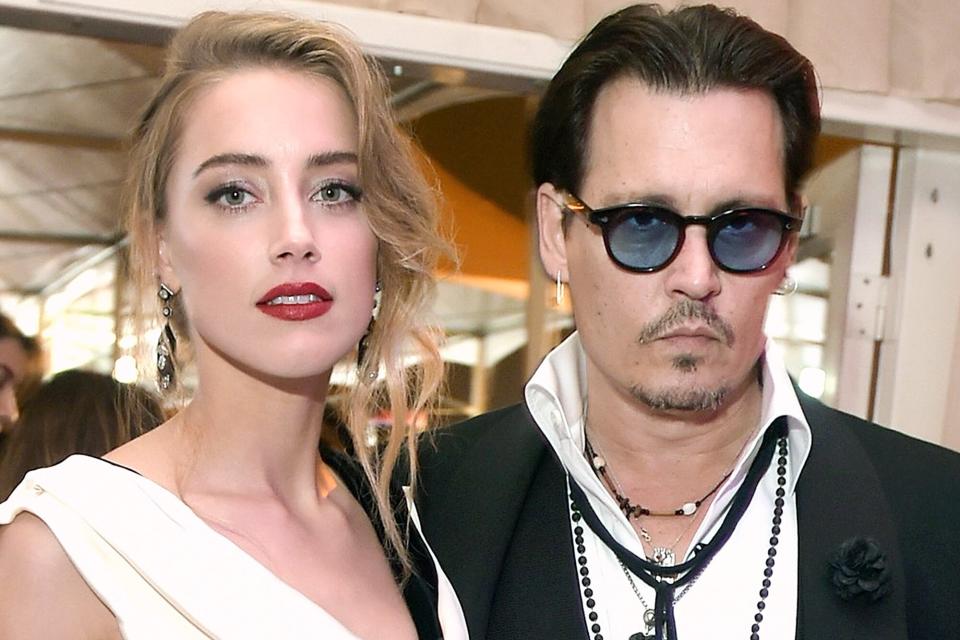Amber Heard's team to call Johnny Depp back on stand: Experts weigh in on how it might impact the case

Amber Heard's legal team is expected to call Johnny Depp back to the witness stand for his defamation trial against her in Virginia.
Depp testified over the course of four days last month, offering his view of how Heard's abuse allegations damaged his career and reputation. Heard had a "need for violence," Depp said, alleging that it was his ex-wife who abused him. Heard painted a different portrait on the stand, recounting Depp's alleged abuse toward her and his substance use.
So far Dr. Dawn Hughes, a clinical and forensic psychologist, and other people from Heard's inner circle, including her friend iO Tillett Wright and sister Whitney Henriquez, have testified as witnesses for Heard. More notably, Heard's team is expected to call on Depp to retake the stand at some point this week. Neama Rahmani, a former federal prosecutor and legal analyst, tells EW the strategy is rooted in control.
By calling Depp, "they get to control the narrative a little bit more," Rahmani says. "We saw how charismatic Johnny was when he testified the first time around, so the last thing you want to do is give him a second opportunity to charm the jurors." In contrast to the "softball questions" Depp's lawyers asked, which he was able to "knock out of the park," Rahmani expects Heard's team to approach Depp more aggressively.

ELIZABETH FRANTZ/POOL/AFP via Getty Amber Heard testifies in Johnny Depp defamation trial
"This is Heard's chance to catch up," Rahmani says. "The con is you're putting a hostile witness in your case-in-chief, so if you don't do a good job, that may undermine your whole case… What Amber needs is some independent corroborative witness. Sexual abuse and domestic are the two most underreported crimes, but some jurors believe they can be falsely reported."
Mitra Ahouraian, the founder and principal attorney at Ahouraian Law, a Los Angeles-based corporate and entertainment law firm, also expects Heard's team to try to regain control of the narrative. "It's a risky strategy, but they almost have nothing to lose," she says.
"Their cross-examination of him early in the case did not go well for Amber," Ahouraian adds. "Attorneys did not seem prepared for the number of objections Depp's team came armed with, and perhaps did not account for the overall charm and credibility of Johnny's nature on the stand. Since Depp's team was first to introduce testimony of his alcoholism and drug abuse — a narrative Heard's lawyers were no doubt planning to lean heavily into — it took some of the sting away when her side finally got into it. It had already been framed by Depp's narrative."
Heard's attorneys, Ahouraian says, "have undoubtedly brushed up on their rules of evidence and may be hoping to elicit some responses from him on the stand that they couldn't before because of the rules of evidence and how they presented their questions… Perhaps they're hoping for a less energetic Johnny." The lengthy trial, Ahouraian notes, has no doubt been emotionally exhausting for all: "[Depp] may not be as alert and mentally sharp as he was when he first took the stand. They could be hoping they can elicit some embarrassing admission from an emotionally drained and worn-out Johnny. "

STEVE HELBER/POOL/AFP via Getty Images Johnny Depp testifies in defamation trial against Amber Heard
As far as the risks, Ahouraian says, "[Depp] has the advantage of having heard all the testimony in the case, which is not typical for a witness and is only allowed because he is a party to the lawsuit. He is intelligent enough to use that knowledge to his advantage." Depp is also "an extremely charming and magnetic presence in any arena, including this trial," Ahouraian observes. "If he comes off as being in command and persuasive, the jury will compare that to Amber's somewhat uneven time on the witness stand, and that will solidify a positive impression of him."
Ahouraian expects Heard's legal team to present questions "less permeable" to objections. "They've had some time now to prepare and frame their questions to avoid as many objections as we saw before," she says. "They will work hard to keep him from straying off into testimony that could be more damaging to their side. They did not do a good job of this last time."
Depp is suing Heard for $50 million over her 2018 Washington Post op-ed detailing her experiences as a domestic abuse survivor. Though Heard never mentioned Depp by name in the piece, his lawyers argue that references to him, and Heard's previous abuse allegations, are clear and have damaged his career and reputation. Heard has filed a $100 million countersuit, claiming Depp and his legal team defamed her by calling her allegations a hoax.
While Depp is by many accounts "winning in the court of public opinion," Rahmani posits that Heard has the legal advantage in the defamation case. "It is very difficult for Depp to prove his case for a variety of reasons," the former prosecutor says. "He needs to prove Heard was never a victim of domestic violence and [her allegations are] false and she acted maliciously. If Heard is able to prove even one of the dozen events she's describing, she wins." When it comes down to it, Rahmani notes, "This case isn't about Johnny trying to collect tens and thousands of dollars from his ex-wife. It's a PR play of trying to resurrect his career."
Rahmani continues: "If you are looking at the law and the jury instructions, Heard has the advantage, but again, I don't know what those jurors are going to do. They can follow the law or say, 'I don't like Amber Heard because she lied at least about donating the settlement funds to charity and exaggerated her injuries.' The challenge Heard has is, a lot of her descriptions, she says, 'I thought Johnny Depp was going to kill me,' and they show pictures that support abuse and violence — her descriptions were a lot worse than the pictures and videos. Folks [may] think she's a victim but she's exaggerating."

Jason Kempin/Getty Images Amber Heard and Johnny Depp in 2015
Heard's testimony that she didn't need medical treatment after alleged violent episodes — including after Depp allegedly sexually assaulted her with a liquor bottle in Australia in 2015 — has raised eyebrows, but Rahmani predicts, "Her lawyers could credibly argue during closing arguments that that's not something she would necessarily seek medical attention for, or the fact that she didn't report the abuse to LAPD. They can credibly argue that that's consistent with the psychology of an abuse victim."
Janie Lacy, a psychotherapist who specializes in relationship trauma, says there are various factors that could contribute to a domestic violence victim not reporting abuse. "While these patterns are not simple, it is possible to discern what makes people who engage in traumatic relationship patterns not reporting instances of violence," Lacy says. "We consider a variety of patterns in the relationship that include the following: When the victim believes in their own uniqueness, when high intensity is mistaken for intimacy, when there is confusion about love, when there are increasing amounts of fear, when there is history of abuse, when there is familiarity with the abuse dynamics."
"In domestic abuse relationships there is a predictable cycle including when victims and victimizers switch roles of rescue and abuse," Lacy continues. "There is an emotional bond that deepens addictive attachments and, in these cases, violence is not reported nor medical treatment is sought by the victim." Lacy also points to trauma blocking, wherein victims of violence numb the pain and avoid the fear.
"The neural pathway involved here relates to a phenomenon called satiation," she explains. "The neurochemical bottom line is anxiety reduction... The victim in these cases minimizes the situation or makes excuses for the victimizer (i.e., [they] only does this when [they are] drunk) therefore they do not call the police but go into a pattern of managing the situation or waiting for it to be over, all in the name of love and protection."
According to Ahouraian, "The most likely outcome in this trial would be for the jury to find that at least some of what Amber testified at trial to be true, which is that she believed she suffered some amount of abuse from Johnny. The jury does not even need to find that Johnny physically abused Amber in order for her to win. They only need to find that in the middle of what everyone can recognize as a toxic and chaotic relationship, that Amber felt that she had been victimized at some point [and] would have reason to have written that Washington Post opinion piece, at least in her mind."
Proving malice can be difficult. "Even if she wins by successfully defending herself against Johnny's defamation claim, Amber is not likely to have a very big counterclaim against Johnny," Ahouraian says, "because it's clear that both Amber and Johnny were pretty awful to one another when they fought."
Related content:


